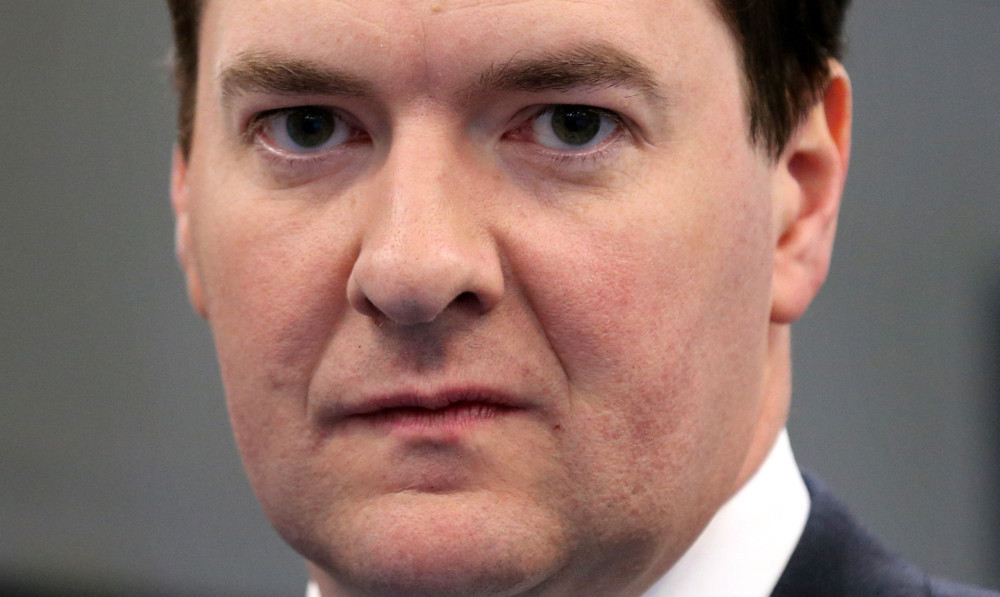A deal to allow an independent Scotland to continue to use the pound as its currency would impose “significant limits” on the economic sovereignty of ministers north of the border, the Chancellor warned.
George Osborne suggested the formal currency union favoured by the Scottish Government could even result in an independent Scotland having to submit budgetary plans to Westminster first for approval, before putting them to Holyrood.
Scottish First Minister Alex Salmond accused him of “sabre-rattling”.
The SNP leader went on to claim if there was a “resounding” vote for independence the Chancellor would “sing an entirely different tune”.
But Mr Osborne insisted ending the current political and economic union between Scotland and the rest of the UK would be “a very deep dive indeed in to uncharted waters”.
The Chancellor spoke out during a visit to Glasgow as a new Treasury report cast doubt over whether a formal agreement could be reached to establish a sterling currency union between an independent Scotland and the rest of the UK.
The Scottish Government has already set out plans to retain the pound if the country becomes independent, creating a “sterling zone” with the remainder of the UK.
Mr Osborne questioned this arrangement saying: “Would a newly-independent Scottish state be prepared to accept significant limits on its economic sovereignty? To submit its budgetary plans to Westminster before Holyrood?”Bargeton’s Blog: Time to bring back the groatThe UK Government report claimed that “appropriate fiscal constraints would be needed in a formal currency union between an independent Scottish state and the continuing UK”.
These are “likely to be more stringent” than those in the eurozone and “would be likely to reduce the sovereignty of the new independent Scottish state over its fiscal choices”.
The creation of a sterling zone is just one of four options for currency in an independent Scotland, according to the report.
If voters opt to leave the UK the country could unilaterally decide to retain the pound, or alternatively could join the euro or establish its own currency.
But Mr Osborne insisted: “All of these alternative currency arrangements are less suitable economically than we have now for both Scotland and the rest of the UK.”
He added: “The conclusion is clear – the pound we share works well. The saying goes ‘If it ain’t broke, why fix it?’ but I say ‘If it ain’t broke, don’t break it’.
“The alternatives to the way Scotland now uses the pound are second best.”
The UK Government’s report, one in a series of papers being prepared ahead of next year’s independence referendum, said a formal sterling union would be “a profound economic change for Scotland and the rest of the UK”.
Mr Osborne also argued it was “unlikely” the rest of the UK would agree to a such a deal, with the report stating: “In the event of Scottish independence, the economic rationale for the continuing UK to enter a formal sterling union with another state is not clear.”
The same report also claimed if a “sterling zone” was established, both governments would need to agree for the Scottish banks to be able to continue to issue pound notes.
This was dismissed by the Scottish Government in a separate report, also published today.
It said the “best option” for an independent Scotland was to retain the sterling, adding: “The pound is currently Scotland’s currency and the Bank of England is Scotland’s central bank.”
It argued this was a “sensible framework” which would “allow the day-to-day operation of monetary policy and the banking system to operate as is currently the case”.
In addition, it would “allow the retention of Scottish banknotes which are supported by an arrangement between the Bank of England and the commercial banks in Scotland where such notes are fully backed by ring-fenced assets held at the Bank”.
The Scottish Government report insisted: “Nothing in a formal monetary union would threaten that.”
Economics experts in the Fiscal Commission Working Group, set up Mr Salmond, have already concluded a sterling zone where an independent Scotland would retain the pound is “sensible” and an attractive choice for the rest of the UK.
Mr Salmond told BBC News 24: “It’s in everyone’s interests to have a currency area after independence – it’s in the interests of Scotland, it’s also overwhelmingly in the interest of the rest of the United Kingdom.”
He said that was for the “very simple reason that huge Scottish resources such as oil and gas would continue to protect the sterling balance of payments”.
Mr Salmond said under a currency union the Bank of England would continue to run monetary policy, adding: “Scotland would have control over taxation, which we don’t have at the present moment, and we would have control of all of our spending, which we also don’t at the present moment.
“So, we would be fiscally independent within that currency area.”
He said: “When serious economic interest takes over, as opposed to the political sabre-rattling we saw today, we will sit down and do what is in the best interests of the people of Scotland, and of course the people of the rest of the United Kingdom.
“That is what I’m doing; I think George Osborne should grow up and do the same.”
